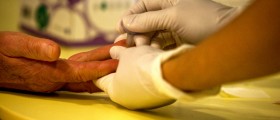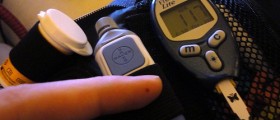
Gestational diabetes is the characterized by a high level ofglucose in the blood during the pregnancy. It is caused by hormonal changes inthe organism of a pregnant woman. These hormones interfere with the capacity ofinsulin to manage glucose from the food, causing insulin resistance. If pancreascan’t substitute enough insulin, blood glucose levels increase significantlyand cause gestational diabetes.
This condition won’t make your baby a diabetic patient, butmight cause her/him to be overweight and be delivered prematurely because ofit.
In most cases gestational diabetes lasts until the childbirthand then the blood glucose return to normal level. However, women who experiencedgestational diabetes are at increased risk of developing diabetes mellitus type2 later in their life.
Remember the Goals
Nutritionists always recommend eating three main meals andtwo or three snacks during the day. Eat every day like that, and do not skip anymeal or snack.
Do not diet or try to lose some weight while you arepregnant. Both your baby and you need nutrients to be healthy and developproperly. As normal, doctors usually consider the weight gain of about 25 to 35pounds for the whole pregnancy.
What to Eat
Carbohydrates are the food ingredients that mostly affectthe level of glucose in the blood. Eat less carbohydrate for breakfast, becauseinsulin resistance is greatest in the mornings. If you experience morningsickness, while still in bed take some crackers or cereals. Try to maintain theconsistent level of carbohydrates throughout the daily meals and snacks.
Use more whole grains, cereals and pasta and eat more rice,fruits and vegetables.
Ensure plenty of calcium and iron in your diet. You need1200mg of calcium every day, so eat at least 4 servings of dairy products, greenvegetables, nuts or calcium fortified beverages. You also need 30 mg of ironevery day, so include 3 servings of iron rich food in your menu. Greenvegetables, eggs, lean meat, fish and poultry all have high amounts of iron.
Provide your body (and your baby) plenty of vitamins also. He/sheand you both need plenty of vitamins A, C and folic acid.
Always drink plenty of water. About 8 glasses of watershould be appropriate amount for every day.
What to Avoid
Avoid alcohol and limit the caffeine to 300 mg a day. Rememberchocolate contain some caffeine too, besides tea, coffee and colas.
Avoid fatty, fried or greasy food and eat fewer productsthat contain fat and sugar. Certain artificial sweeteners are approved for pregnantwomen by the FDA. These are aspartame and acesulfame K, but always consult yourdoctor about the appropriate and safe amounts of these sweeteners.















Your thoughts on this
Loading...